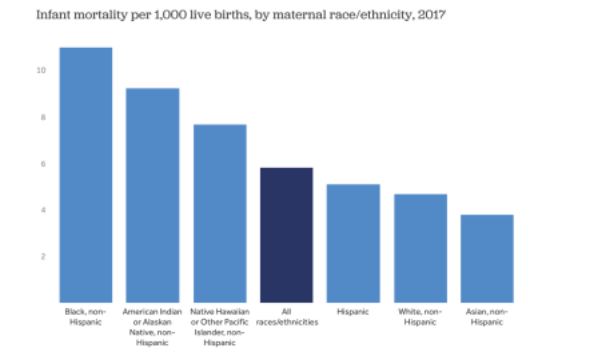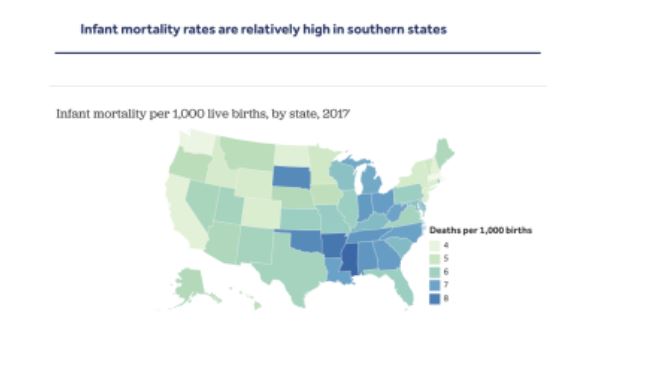
Written by Shamso Mohamed, Member of the YPAB Editorial Team
(Featured photo by Mario Tama, Getty Images)
In the United States, there have been striking racial disparities in infant and maternal mortality rates that have persisted for decades. In February 2022, BBC World News featured Sisters in Loss, an organization that provides Black women a voice to speak on a platform for maternity, on a news segment to specifically highlight the voices of Black women that are ignored and dangers they disproportionately face in regards to infant mortality. Four women from Sisters in Loss Song shared their stories of doctors not feeling their concerns treated seriously by clinicians:
“….I woke up. I was having really bad back pain, and I was told by my doctor when I called that I was just constipated. They told me to come back in another few hours for an ultrasound. I never even made it back to that ultrasound because I miscarried at home.” – Tamira Dunn, Sisters in Loss
They felt ignored, unheard, and discriminated against. Black women being unable to trust medical professionals to provide guidance to avoid miscarriages and infant mortality will lead to further distrust and more ambiguity of why African American women face higher rates of infant mortality. These bias treatments are important to solve and acknowledge because they contribute to the risks Black women experience such as pregnancy related high blood pressure, blood vessel obstruction and mental health conditions.
Over the course of these recent years, COVID-19 pandemic threw a spotlight on high infant and maternal death rates for African American women. It became clear that the pandemic exacerbated already existing health inequalities for people of color. Furthermore, maternal and infant mortality overall links to issues surrounding pregnancy and birth outcomes. The United States has the highest rates of maternal and infant mortality. This simply means that America is facing high levels of pregnancy and birth risks/deaths. For example, over 50,000 women across the states each year experience life-threatening pregnancy-related complications. Such rates are extremely alarming and have risen public policy emergencies to tackle and solve the public health issues surrounding it. From the statistics of maternal and infant mortality, it is evident and predominant that African American mothers and their infants are at the forefront of health risk. The rates are most dramatically affected by Black women who have a three to four times rate of complications compared to their racial/ethnic counterparts. Thus, in the United States, African American women have the highest infant mortality rates of any group (figure 1).

Figure 1: Infant mortality per 1,000 live births, by maternal race/ethnicity, 2017
In order for us to tackle the public health crisis of this topic, we must understand the reasons as to why African American women have such alarming risks. Structural racism exacerbates the risks African American women face due to public policies, institutional spaces, and social spheres of healthcare. Such issues are evident in the ways African American women often receive poor quality care, denial of care when they seek help and the ways their physical and mental health are undermined.
In general, there are more and more laws and policies that are being put in place that restrict solutions that could push back against this public health crisis, sexual and reproductive health care. Ever since the fall of Roe v Wade, 14 states have moved to restrict reproductive rights of women, and many other states are in the battle over reproductive rights. The ones taking the biggest negative impact are African American women. There is already the issue of African American women receiving less health care than their racial/ethnic counterparts, but they also may not be able to have the necessary advice from their medical counsel’s when it comes to concerns about risks to their bodies during pregnancy. Additionally, restrictions may cause psychological distress of not having autonomy of one’s body, which can lead to poor birth outcomes. Lastly, restriction policies can increase the risk of postpartum depression, which can contribute to the infant mortality rates. Ecological studies have shown that continued state funding for family planning and abortion services is associated with lower infant mortality rates, especially for women of color.
Thus, policy frameworks are needed and required to eliminate racial disparities in maternal and infant mortality. Solutions focusing on sexual and reproductive policies are key because they enable us to tackle health concerns that endanger the lives of Black mothers and their children. For maternal and infant mortality health, we need to prioritize sexual and reproductive policies that cater for black women in order to address the racial disparities they experience in health care treatment. There are several solutions we could implement to improve access to services, quality of care, and enhance support for African American mothers. Firstly, we need to enhance the access to services for these groups. This could be by strengthening existing healthcare programs, providing earlier screening and treatment and to over tools and resources to understand the healthcare system. These changes are important because they will reduce the lack of access these groups experience and bring greater equality and distribution of services. For example, it will help reduce the geographically uneven distribution of infant mortality rates that are relatively higher in southern states (figure 2).

Figure 2: Infant mortality rates are relatively high in southern states
Secondly, we need to improve the quality of sexual and reproductive care and protections provided to pregnant women. It is clear from wider research that pregnant women face higher mental health issues, thus providing more assessments for mothers and infants will provide healthier environments for support. As well as this, we need to provide a more diverse healthcare workforce that are legally able to provide proper counsel so that Black mothers can feel more safer and supported. This can be conducted by electing reproductive champions of color into office on the state level to advocate the voices of Black mothers. Elected officials who can also pass policies locally and statewide to strengthen health care and protect healthcare workers. Finally, we need to enhance support for families both before and after birth. It is because they face challenges throughout their journey and thus, need access to social programs that support their basic economic needs.
Most importantly, there needs to be a more deliberate focus on strengthening all that we do in healthcare in the health, food and nutrition, sexual and reproductive health rights. Overall, such policies are key because they will promote and provide better health outcomes for African American women and their infants. There needs to be a deliberate focus to support marginalized communities locally, by state, and nationally.
